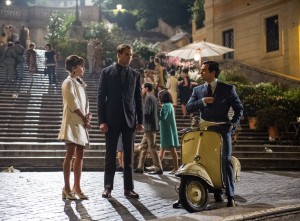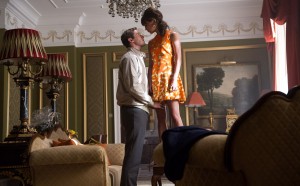
With James Bond working hard to keep his newest adventures real and gritty, The Man From U.N.C.L.E. takes the reverse approach. This is no parody, but it is a love letter to the Dr. No era of espionage thrillers; it keeps the Cold War setting and production design, all the while holding its tongue firmly in cheek. Thanks to some inspired casting and stylish visuals, director Guy Ritchie (Sherlock Holmes, Sherlock Holmes: Game of Shadows) manages to pull it all off. It’s a fun throwback that will keep most viewers amused and entertained.
 Based upon the 60s television series that Bond author Ian Fleming assisted in creating, the plot follows a suave American super-spy named Napoleon Solo (Henry Cavill). After a messy run in with the hulking KGB agent Illya Kuryakin (Armie Hammer), the two learn that their respective governments have teamed them up to stop a nefarious plot that could threaten the entire world. Naturally, they don’t get along, but are instructed to work through any differences to accomplish their immediate goal, at which point they can turn on one another.
Based upon the 60s television series that Bond author Ian Fleming assisted in creating, the plot follows a suave American super-spy named Napoleon Solo (Henry Cavill). After a messy run in with the hulking KGB agent Illya Kuryakin (Armie Hammer), the two learn that their respective governments have teamed them up to stop a nefarious plot that could threaten the entire world. Naturally, they don’t get along, but are instructed to work through any differences to accomplish their immediate goal, at which point they can turn on one another.
The material is ripe for comic banter and the two leads do an excellent job. They’re constantly at each other’s throats, trading some humorous jabs (verbally and otherwise) throughout the early parts of the film. While the two actors may not have seemed like the most obvious choices for their roles on paper, together they couldn’t be better. Whether one is watching the other struggle with nasty opponents while sipping on wine, or the two are arguing over how to deal with a captured suspect, the end result is usually very amusing.
Cavill sells a difficult and in some respects underdeveloped role. The heroic Solo is the typical secret agent, possessing a flippant sense of humor (even when antagonists are getting the better of him) and charm with the ladies, not to mention confidence that exudes levels approaching smarminess. This is not a particularly deeply written character and it could have all gone wrong very easily, but somehow the actor keeps the role from coming across as grating.
 In the end, it’s Hammer who is the scene-stealer. As written, his character is far more nuanced, interesting and relatable. Kuryakin is a tough guy with daddy issues that doesn’t have a way with words and struggles with his own violent impulses (often in the most inappropriate of environments, including high society functions). He also appears to have feelings for Gaby (Alicia Vikander), the woman they’re escorting on the mission. In the end, there’s a lot more depth and drama there and Hammer makes the most of it. This role is fascinating and entertaining to watch.
In the end, it’s Hammer who is the scene-stealer. As written, his character is far more nuanced, interesting and relatable. Kuryakin is a tough guy with daddy issues that doesn’t have a way with words and struggles with his own violent impulses (often in the most inappropriate of environments, including high society functions). He also appears to have feelings for Gaby (Alicia Vikander), the woman they’re escorting on the mission. In the end, there’s a lot more depth and drama there and Hammer makes the most of it. This role is fascinating and entertaining to watch.
And of course, it’s all nice to look at visually. The 60s fashions and production design pop and Ritchie captures the various chases with energetic and exciting camera moves (not to mention a few tried and true techniques like split-screen). It actually evokes a bit of nostalgia for the espionage thrillers of old. The movie is full of great 60s music as well, adding to the stylized vibe.
Alas, as the evil plot is revealed and the villains make their final movie, the movie does begin to run out of steam. And admittedly, the climax isn’t quite as exciting or unique as the action that precedes it. Still, this is a minor beef in an otherwise very enjoyable effort.
As spy flicks go, the movie hits the target far more often than it misses and this reviewer would have no problems seeing all the agents in The Man From U.N.C.L.E. take on more assignments in the future.


